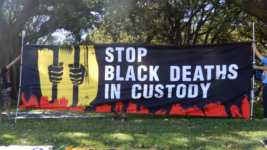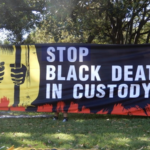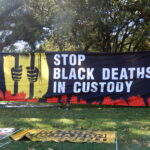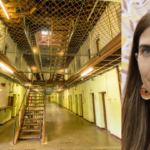The Issue of Police Investigating Police Over Aboriginal Custody Deaths Is Finally Becoming National Issue

The persistent calls for an independent investigation into the 27 May 2025 death in police custody of Warlpiri man Kumanjayi White, which would involve a body other than the Northern Territory Police Force, which is the law enforcement agency that employs the officers who killed the 24-year-old man in response to alleged shoplifting in Coles Alice Springs, are continuing nationwide.
Following most First Nations deaths in custody, calls for an independent investigation are made, as the usual practice involves the Australian police force responsible for the death then being charged with investigating its own officers involved in the incident, which is considered to result in biased outcomes, especially as charges being pressed in relation to these deaths are close to nonexistent.
The difference with the death of White is the calls have not remained limited to the specific jurisdiction in which the custodial death occurred, which is the norm. Rather his death in custody has sparked a nationwide debate, with calls for an independent inquiry coming from multiple authorities, including the federal minister, and these calls are persisting weeks after the incident.
The reasons why the argument around police investigating its own are continuing in the case of White, who was killed whilst being restrained by two NT police officers, is that he was from Yuendumu, which has a population of around 870, and this remote Aboriginal community was also home to 19-year-old Warlpiri man Kumanjayi Walker, who was shot dead by NT police in late 2019.
A call for an independent inquiry from the Indigenous affairs minister, Malarndirri McCarthy, was an intervention that’s not regularly expected to come from the federal member, and neither was last Friday’s joint call coming from the Australian Human Rights Commission (AHRC) president and its seven commissioners.
So, with all this heightened attention in regard to Australian police investigating their own, this issue might finally garner the serious attention it deserves.
Independent bodies charged with inquiries
The AHRC president and its commissioners called for “immediate reform over the ongoing crisis of Aboriginal deaths in custody” in a 13 June statement, which highlighted that almost 600 Aboriginal and/or Torres Strait Islander people have died in custody since the 1991 Royal Commission Into Aboriginal Deaths in Custody released its report containing 339 recommendations.
“Our people are dying in a system that has failed them from the beginning. The need for transformational reform is undeniable,” insisted AHRC Aboriginal and Torres Strait Islander Social Justice commissioner Katie Kiss. The Kaanju and Birri/Widi woman added that during a recent trip to the NT she was informed that the region is undergoing an overbearing policing and corrections crisis.
Indeed, while such issues have long plagued the NT, they’ve been exacerbated of late, ever since the NT Country Liberals took office last August.
The Finocchiaro government’s tough-on-crime lawmaking frenzy, which took place last October, has since seen a 21 percent increase in NT prisoner numbers, 88 percent of whom are First Nations adults, while around 40 Aboriginal people are being taken into police custody in the NT on a daily basis.
“Without an evidence and human rights-based approach to justice and corrections, the massive overrepresentation of our peoples in custody – and dying in custody – will remain a national shame,” Kiss continued. “Enough is enough.”
The AHRC commissioner is further demanding all the Royal Commission recommendations be implemented, while AHRC president Hugh de Kretser is calling for “independent oversight authorities to be established in all jurisdictions, to end the practice of police investigating deaths in police custody”.
“Since colonisation, Australian law has too often delivered injustice for First Nations people,” de Kretser underscored last Friday. “When police investigate themselves, it breeds mistrust and increases the risks of poor investigations and lack of accountability. While coronial inquests provide some independence, they rely on police-gathered evidence.”
Reasonable and plausible
Kumanjayi White lived in assisted state care in Mparntwe-Alice Springs due to his disabilities. Two plainclothes NT police officers intervened in a dispute between White and security over alleged shoplifting, and while the officers were forcibly restraining White, he stopped breathing. NT police won’t release the related CCTV footage, and neither has it stood down the officers involved.
The other death to have affected the Yuendumu community recently, occurred when NT police officer Zachary Rolfe shot 19-year-old Kumanjayi Walker in a family home on 9 November 2019.
Despite the second two of three shots Rolfe fired, being directly shot into Walker’s ribcage whilst the then constable’s partner was on top of him, the officer was acquitted of murder, manslaughter and violent act causing death.
Minister McCarthy cited the “many traumas” that Yuendumu has faced as reason for her intervening to call for a body independent of NT police to investigate the killing. Senator Lidia Thorpe has reiterated this, as has federal Labor MP for Lingiari Marion Scrymgour, who suggested that the Australian federal police undertake the investigation.
NT chief minister Lia Finocchiaro, the driving force behind the hideous crackdown the NT Country Liberal government is waging on the 30 percent of the NT population that is made up of Aboriginal people, told the press that she spoke to McCarthy about the idea of an independent investigation, and she found the exchange “really unhelpful” and “uneducated”.
But perhaps Finocchiaro might eat her words now that the AHRC has come to the table with a concrete idea regarding an independent body, with de Krester adding that “an adequately resourced independent police oversight authority, to investigate all police contact deaths” could be established, with “successful models” existing “worldwide, including Northern Ireland’s Police Ombudsman”.
Demands that aren’t going away
Since the 1991 Royal Commission report, 597 First Nations deaths in custody have taken place. Yet, there has not been one police or corrections officer having been convicted in relation to any such deaths, while recent years have seen an NT police officer, a WA police officer, and a NSW prison guard charged with murder in relation to an Aboriginal custody death, yet all have then been acquitted.
Following the death of White, another Aboriginal death in custody has taken place in the Northern Territory, which involved a 68-year-old Wadeye elder dying in hospital on 7 June.
The senior elder and noted educator had been taken into custody at the airport in Garramilla-Darwin on 30 May, as he was deemed too drunk to board his plane. Officers first took the Wadeye elder to the police watchhouse, prior to deciding he should be taken to hospital, however the man evidently became unresponsive in the police van shortly before arriving there.
Justice Not Jails spokesman Stephen Enciso told Sky News late last week that his legal advocacy group are also calling for an independent investigation into this second custody death, pointing out that the Royal Commission was clear that “arrest should be a measure of last resort for intoxication and there should be sobering up facilities and all sorts of noncustodial alternatives”.
“Why was he taken to the Palmerston Watchhouse and not straight to the hospital?” Enciso questioned. “This is another case where police should not be involved in the investigation.”
Justice Not Jails also announced it would be presenting NT chief minister Finocchiaro with 760 signed letters it’s collected over the past fortnight, calling on her to allow a fully independent inquiry into Kumanjayi White’s death, as well as to ensure that officers are better trained in de-escalation techniques and an independent NT police watchdog be established.







